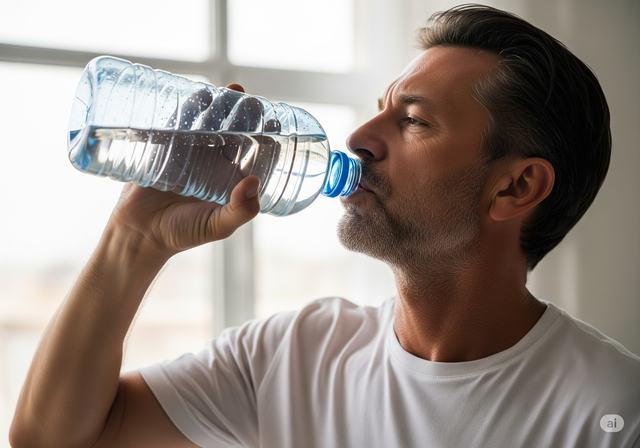However, many people do not really care about taking care of their kidney health until there are signs of instability, according to Cleveland Clinic (USA).
Dr. James Simon, a nephrologist in the US, gives specific and easy-to-follow advice to help you maintain kidney function effectively.
Don't drink too much water
Many people mistakenly believe that the more water they drink, the healthier their kidneys will be. However, contrary to popular belief, drinking too much water does not improve kidney function.
Drinking too much water can even put unnecessary stress on your kidneys.

Drinking too much water can put pressure on your kidneys.
Photo: AI
Eat healthy
Most kidney problems stem from chronic medical conditions such as diabetes, high blood pressure or heart disease.
Therefore, the best way to protect your kidneys is to maintain a healthy diet that helps control weight and blood pressure.
Accordingly, you should cut down on salt, sugar and processed foods.
Exercise regularly
Regular physical activity is an integral part of maintaining overall health, including kidney function.
Exercise will help you maintain a healthy weight and prevent high blood pressure, two factors that directly affect kidney health.
However, if you're not used to exercising and suddenly start doing heavy exercise, it can cause serious problems, especially if you're at risk for heart disease.
So, start with gentle exercises like walking, yoga, slow cycling… and consult your doctor if you have any underlying medical conditions.

Regular physical activity is an integral part of maintaining overall health, including kidney function.
Photo: AI
Quit smoking
Smoking not only harms the lungs but also directly affects the kidneys. Smoking damages blood vessels, reducing blood flow to the kidneys, thereby impairing their blood filtering function.
Be careful when using painkillers
Over-the-counter medications such as ibuprofen, naproxen, can be harmful if used regularly.
According to Mr. Simon, these drugs can be harmful to the kidneys if used too often or for a long time.
If you are taking it for short-term pain relief, it is not a concern. But if you need to take it long-term (for arthritis, chronic pain, etc.), ask your doctor to monitor your kidney function or find an alternative.
Routine kidney function tests
If you have diabetes, high blood pressure, or heart disease, ask your doctor about regular kidney function tests. This is a simple way to detect early signs of kidney damage.
Source: https://thanhnien.vn/muon-than-khoe-thu-lam-cac-dieu-sau-1852506230902039.htm


![[Photo] Party Congress of the Central Internal Affairs Commission for the 2025-2030 term](https://vphoto.vietnam.vn/thumb/1200x675/vietnam/resource/IMAGE/2025/6/23/5bf03821e6dd461d9ba2fd0c9a08037b)



![[Photo] Prime Minister Pham Minh Chinh holds meeting to launch exhibition of national achievements to celebrate 80th National Day](https://vphoto.vietnam.vn/thumb/1200x675/vietnam/resource/IMAGE/2025/6/23/0c0c37481bc64a9ab31b887dcff81e40)






























![[Photo] Conference to disseminate the implementation of the Plan to promote digital transformation to meet the requirements of restructuring the political system's apparatus](https://vphoto.vietnam.vn/thumb/1200x675/vietnam/resource/IMAGE/2025/6/23/4744403cccd144b79086799e2ceb686e)



































































Comment (0)